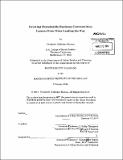| dc.contributor.advisor | J. Phillip Thompson. | en_US |
| dc.contributor.author | Moreno, Elizabeth Hoffecker | en_US |
| dc.contributor.other | Massachusetts Institute of Technology. Department of Urban Studies and Planning. | en_US |
| dc.date.accessioned | 2014-05-23T19:41:06Z | |
| dc.date.available | 2014-05-23T19:41:06Z | |
| dc.date.copyright | 2014 | en_US |
| dc.date.issued | 2014 | en_US |
| dc.identifier.uri | http://hdl.handle.net/1721.1/87520 | |
| dc.description | Thesis: M.C.P., Massachusetts Institute of Technology, Department of Urban Studies and Planning, 2014. | en_US |
| dc.description | Cataloged from PDF version of thesis. | en_US |
| dc.description | Includes bibliographical references (pages 167-177). | en_US |
| dc.description.abstract | A new phenomenon has emerged over the past decade in a rising number of cities across America: what I am calling "sustainable business communities." These are place-based networks of independent, locally-owned businesses committed to generating social and environmental value in addition to economic value. They are prominent and increasingly influential players in the cities where they are largest, helping these cities progress towards sustainability goals and establish national reputations as sustainability leaders. Nevertheless, little is known about sustainable business communities within the academic and economic development literature, where they are still largely invisible despite their potential to play a significant role in helping cities achieve healthier, more sustainable, and more equitable local economies. This study starts to address this gap, examining sustainable business communities in five American cities where they have grown to prominence in recent years. Through interview-based case studies, I examine how these communities originated and grew over the past decade in each of these places, which vary significantly from each other in terms of size, geography, and urban context. The analysis in turn yields a fuller understanding of what these communities are, what their significance is, and the ways in which they have contributed to these cities' capacity to achieve large-scale, citywide sustainability and social equity goals. By exploring the common strategies and processes that have driven the growth of these five sustainable business communities to date, this study offers lessons and insights for city governments, economic development practitioners, and community members interested in learning how they can encourage and support the growth of their own sustainable business communities. | en_US |
| dc.description.statementofresponsibility | by Elizabeth Hoffecker Moreno. | en_US |
| dc.format.extent | 177 pages | en_US |
| dc.language.iso | eng | en_US |
| dc.publisher | Massachusetts Institute of Technology | en_US |
| dc.rights | M.I.T. theses are protected by copyright. They may be viewed from this source for any purpose, but reproduction or distribution in any format is prohibited without written permission. See provided URL for inquiries about permission. | en_US |
| dc.rights.uri | http://dspace.mit.edu/handle/1721.1/7582 | en_US |
| dc.subject | Urban Studies and Planning. | en_US |
| dc.title | Growing sustainable business communities : lessons from cities leading the way | en_US |
| dc.type | Thesis | en_US |
| dc.description.degree | M.C.P. | en_US |
| dc.contributor.department | Massachusetts Institute of Technology. Department of Urban Studies and Planning | |
| dc.identifier.oclc | 879675492 | en_US |
